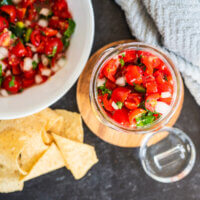Now that we’re on the verge of tomato and pepper season, I wanted to share this recipe for fermented salsa. Fermenting fresh salsa is an easy way to make it last longer without canning and it adds a probiotic boost. Try it on tacos or with some homemade tortilla chips!
We eat and drink a lot of fermented foods, from water kefir to sourdough, to sauerkraut. Fermented salsa is definitely one of the easiest ways to get the health benefits of fermented foods in your diet. The fermentation process creates good bacteria that help improve gut health and the immune system.
If done properly, fermented salsa will last months in the fridge or cold storage and get more probiotics with age. This spicy Mexican condiment is a staple in our house!
Salsa Ingredients and Substitutions
While I like a little kick to my salsa, you can make this as mild or spicy as you like. For a mild version (especially for kids who don’t like spicy) use bell peppers. I’ll often grab whatever is ripe in our garden. You can also add jalapeno peppers, habanero peppers, or a blend of whatever you like.
The fresh tomatoes are really what makes this recipe so good though. If you don’t have any growing in your garden then check out your local farmer’s market. Homegrown and local is so much better than what’s available at most grocery stores!
I also included different spices in the recipe, but I don’t use exact amounts. Feel free to use however much of which spices your family likes. Or keep it simple and omit them altogether.
Whey vs Salt Fermentation Method
I usually make this with the whey leftover from making homemade yogurt cheese. This lacto-fermented version features beneficial bacteria from the lactic acid in yogurt, but it’s optional. You’ll still get probiotic benefits from just using salt. Fermenting the salsa also extends the shelf life.
If you don’t have whey from strained yogurt, you can also use some whey starter instead. Cultures For Health is a great place to get some.
Tip For Fermenting Salsa
If this is your first time fermenting veggies, there are a few things to know before you get started. Be sure to use a completely clean jar, lid, and supplies when making this. You don’t want to introduce any competing bad bacteria into your salsa!
Once everything has been chopped and mixed it will sit on the counter at room temperature for about 2 days. If your home is warmer (hello summer!) this process won’t take as long. You want to watch for fizzy little bubbles which will tell you the salsa is ready.
You don’t need any fancy equipment, but I prefer to use a fermentation weight for this. It keeps the veggies under the liquid so they don’t start to mold. If your salsa gets really fizzy you may need to “burp” your mason jar. Simply remove the lid to let some of the excess gas escape and then put it back on. Some people prefer to use an airlock or fermentation lid for this (to prevent jar explosions!).
How to Use Fermented Salsa
You probably already have plenty of foods your family loves with salsa, but here are a few of my favorite ways to use it!

Fermented Salsa Recipe
Homemade salsa with a probiotic twist; naturally fermented to add extra nutrients and flavor.
- 3 lbs fresh tomatoes (about 4 and 1/2 cups chopped)
- 2 peppers (such as bell pepper, cayenne, or jalapeno peppers)
- 1-2 onions (about 1 cup chopped)
- 4 cloves garlic
- ½ cup fresh cilantro
- 1 lemon (juiced)
- 1 lime (juiced)
- 2 TBSP sea salt
- spices to taste (such as oregano, black pepper, cumin, chili powder, and cayenne pepper)
- ½ cup whey (optional)
-
Chop tomatoes, onion, pepper, garlic, and cilantro and add to a large bowl.
-
Add lemon and lime juice juice, sea salt, and spices to taste.
-
Add whey (if using) and stir well.
-
Transfer the diced veggie mixture to a tall mason jar/fermentation jar. Pour in any juice from the bowl.
-
Press down to submerge veggies and place a weight on top to keep them submerged.
-
Seal the top of the jar and let ferment for about 2 days away from direct sunlight. It will get fizzy and start to get small bubbles.
-
After 2 days, remove the fermentation weight and enjoy or store it in the fridge.
Nutrition Facts
Fermented Salsa Recipe
Amount Per Serving (1 serving)
Calories 18
Calories from Fat 2
% Daily Value*
Fat 0.2g0%
Saturated Fat 0.03g0%
Polyunsaturated Fat 0.1g
Monounsaturated Fat 0.02g
Sodium 562mg24%
Potassium 171mg5%
Carbohydrates 4g1%
Fiber 1g4%
Sugar 2g2%
Protein 1g2%
Vitamin A 513IU10%
Vitamin C 19mg23%
Calcium 12mg1%
Iron 0.3mg2%
* Percent Daily Values are based on a 2000 calorie diet.
- If you want a less chunky salsa then you may want to pulse it in a food processor before moving it into a mason jar/fermentation jar.
- The exact fermentation time depends on how warm your home is. Fermented vegetables ferment faster in warmer weather.
- One serving size is about 1/4 cup.
A Fast and Easy Tip
If you don’t have the time or ingredients to make your own salsa, you can get the benefits of fermented salsa by fermenting store-bought salsa as well. If possible, use the freshly made salsas in the refrigerated section, but you can ferment canned versions also.
More Fermented Food Recipes
Want to try your hand at more fermented foods? Here are some ideas to get you started!
Have you ever fermented veggies before? What’s your favorite way to use salsa? Leave a comment and let us know!

